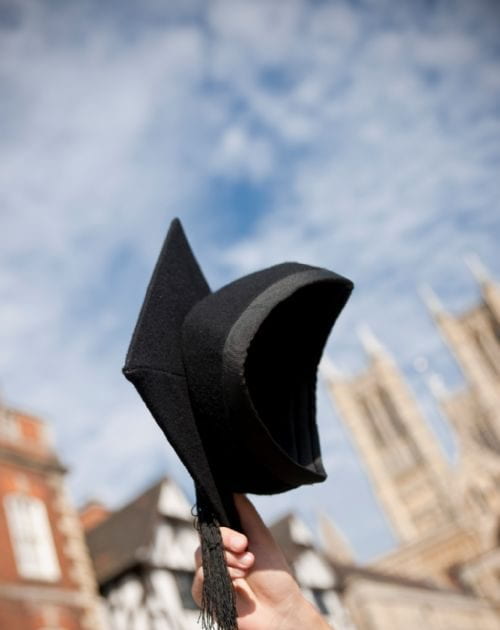Lincoln graduation to celebrate UK’s first Nursing Associates
21 January 2019
The UK’s first ever registered Nursing Associates will be among almost 1000 students graduating from the University of Lincoln this week. Taking place on Wednesday 23rd and Thursday 24th January, three ceremonies will see hundreds of undergraduates, postgraduates and honorary guests accept their degree certificates and celebrate with friends, family and tutors in the impressive […]

The UK’s first ever registered Nursing Associates will be among almost 1000 students graduating from the University of Lincoln this week.
Taking place on Wednesday 23rd and Thursday 24th January, three ceremonies will see hundreds of undergraduates, postgraduates and honorary guests accept their degree certificates and celebrate with friends, family and tutors in the impressive surroundings of Lincoln Cathedral.
There will be a cohort of Nursing Associates, the first to be registered in the country, among those celebrating the conclusion of their studies.
The University of Lincoln is one of a number of training providers across the UK supporting the introduction of Nursing Associates – a new support role that will sit alongside existing healthcare support workers and fully-qualified registered nurses to deliver hands-on care for patients. The role is designed to address a skills gap between health and care assistants and registered nurses, and it also provides a progression route into graduate level nursing.
The newly qualified Nursing Associates are trained to work with people of all ages and in a variety of settings in health and social care. They will become new members of the nursing team, supporting registered nurses and enabling them to focus on more complex clinical duties.
Lincoln’s Nursing Associates will graduate alongside students from all four of the University’s academic Colleges and two Honorary Graduates. Award-winning science-fiction and fantasy author, Adrian Tchaikovsky, who has more than 20 novels and novellas to his name, will become an Honorary Doctor of the Arts, and the University of Lincoln’s Pro Chancellor, Haydn Biddle, will receive the special award of Doctor of the University in recognition of his invaluable contribution to the institution. The University’s Academic Writing Support Manager, Judith Elkin, will also pick up the Vice Chancellor’s Professional Services Award for setting up and developing a new writing support centre for students.
University of Lincoln Vice Chancellor, Professor Mary Stuart, said: “Our graduation ceremonies are a real highlight of the academic calendar. We congratulate our students on the outstanding achievements and many years of hard work, we say thank you to their family, friends and tutors for supporting and inspiring their studies, and we look ahead to the exciting futures they have stretching out ahead of them.”
One PhD student collecting her doctorate next week has already secured a coveted research role at Cambridge University. Anna Frohnwieser completed her PhD at the University of Lincoln and is now a Research Associate at Cambridge, investigating social cognition in animal and human behaviour – specifically causal reasoning in children and crows.
At Lincoln, Anna developed robotic reptiles to investigate the social abilities of bearded dragons.
Previous Lincoln research revealed that reptiles are capable of learning how to perform tasks by watching and imitating other animals. Anna followed this work by exploring the specific mechanisms involved in lizards being able to mirror the actions of other animals and, with computer scientists, she developed robotic bearded dragons in order to closely study this behaviour.
Anna conducted experiments to investigate how bearded dragons perceive different features such as the shape and colour of the body, the presence of eyes, and different types of motion, and her final robots could perform different types of head bobbing – a behaviour that is often used by bearded dragons to communicate dominance.
Her work revealed fascinating differences between the way in which female and male bearded dragons responded to the robots, with males paying more attention to them when they behaved erratically than when they exhibited realistic head bobbing, indicating that they were ‘surprised’ by these behaviours.
Anna is one of many PhD students who will celebrate becoming a ‘Doctor’ at the graduation ceremonies next week.
